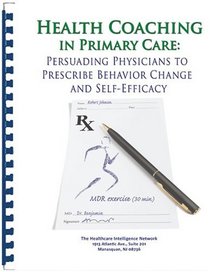Search -
Health Coaching in Primary Care: Persuading Physicians to Prescribe Behavior Change and Self-Efficacy
Health Coaching in Primary Care Persuading Physicians to Prescribe Behavior Change and Self-Efficacy
Author:
Relationships are important in healthcare perhaps none more so than the physician-patient bond. Until now, these encounters have largely been focused on treating illness, not preventing it. But as healthcare acknowledges the clinical and cost benefits from health coaching in disease and health management, some experts say that primary care is ri... more »
Author:
Relationships are important in healthcare perhaps none more so than the physician-patient bond. Until now, these encounters have largely been focused on treating illness, not preventing it. But as healthcare acknowledges the clinical and cost benefits from health coaching in disease and health management, some experts say that primary care is ri... more »
ISBN-13: 9781934647363
ISBN-10: 1934647365
Publication Date: 7/17/2008
Pages: 35
Rating: ?
ISBN-10: 1934647365
Publication Date: 7/17/2008
Pages: 35
Rating: ?
0 stars, based on 0 rating
Publisher: Healthcare Intelligence Network
Book Type: Plastic Comb
Members Wishing: 0
Reviews: Amazon | Write a Review
Book Type: Plastic Comb
Members Wishing: 0
Reviews: Amazon | Write a Review




